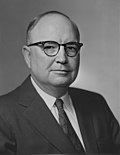| | |||||||||||||||||
| |||||||||||||||||
| |||||||||||||||||
 County results Eastland: 80-90% >90% | |||||||||||||||||
| |||||||||||||||||
| Elections in Mississippi |
|---|
 |
The 1960 United States Senate election in Mississippi was held on November 8, 1960.
Contents
- Democratic primary
- Candidates
- Results
- Republican primary
- Candidates 2
- Results 2
- General election
- Results 3
- See also
- References
Incumbent Senator James Eastland was re-elected to a fourth term in office against nominal opposition. The primary race attracted little attention and as was typical of elections in the South at this time, the general election was a foregone conclusion in favor of the Democratic candidate, Eastland. [1]


